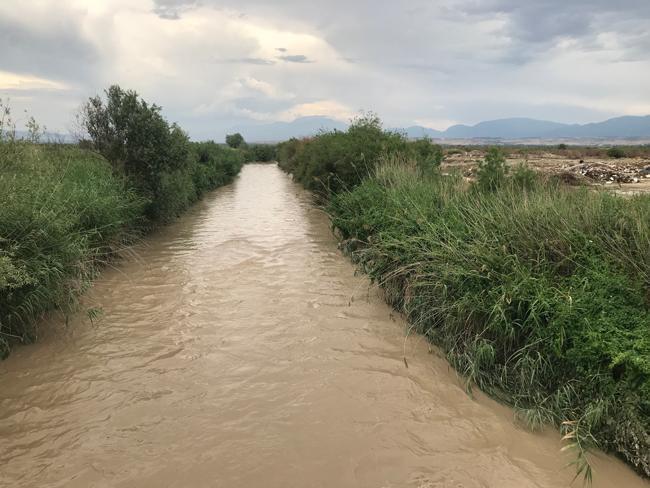
The Greater (“Büyük” in Turkish) Menderes River, one of the biggest rivers in the Aegean region, is under contamination by industrial waste, making it Turkey’s third most polluted river, according to experts.
The river, historically known as the Meander River, hit headlines in May following reports of mass deaths, which have washed ashore in the western province of Aydın. Such an environmental tragedy is not a first for the river, as 1.5 million trout have been suspected of being killed due to waste from juice factories along the river in Denizli, another Aegean province.
Experts have warned about the high levels of the pollution of the river water for many years now, but they are now calling for an intervention more than ever before, with growing news of environmental disasters putting human health in danger.
This river irrigates efficient farmlands and includes tributaries of other rivers and streams and many populated towns within its limits in the Aegean region. The river originates in the vicinity of Dinar near Afyon and has reached the Aegean Sea near Söke plain. It is 548 kilometers long and the bedrock structure of the river is composed mainly of metamorphic rocks.
Daily Hürriyet has visited some of the areas along the river in an attempt to witness the pollution. The waters in the Eldere and Suçıkan villages of Dinar are placid and clear, resembling a heaven so to speak. The waterfalls in the area accommodate ducks, goose, and various fish and bird types. Locals come here to enjoy the serene view.
“How can a river coming from such a source cause death?” is the first question that comes to mind when one sees the source of the Menderes.
The province of Uşak has a heavy leather production industry. Industrial waste pollutes the Ulubey Creek, which connects with the Great Menderes River bringing its pollution along with it. There is a bad smell and the water loses its clarity at the point where the two waters connect. It can clearly be seen where the river’s color and smell begin to change while it passes through the Ulubey Canyon.
As we reach the Sarayköy district of the Denizli province and the Çürüksu stream, the pollution becomes visible even to the naked eye, with the bad smell reaching an unbearable level.
“The name of this place is Çürüksu, but now it is known as the ‘Smelly Menderes’ because it smells really bad. We are afraid while living here. There is a ban on fishing here. Its color does not look like water,” locals told daily Hürriyet.
In the Balat village of Aydın’s Didem district, the water takes on the color of coal tar. The smell resembles the rotting of animal corpses. The Balat Delta is the last point where the river connects to the Aegean Sea. Thousands of fish died here last week.
Prof. Serap Birincioğlu from Aydın’s Menderes University (ADÜ) Veterinary Faculty told daily Hürriyet “everyone was aware of the danger” caused by the river.
“For the protection of the Menderes river, the Ekodost Foundation has issued a regulation. The water is being polluted. The water looks like coal tar. There are tons of dead fish. We are facing a big environmental problem. It is very difficult for the river to recover itself in a short period of time,” she said.
“The cause of the industrial waste can be determined. The contaminants and whether or not the water is being treated should be checked. It must be followed. The [water’s] path and its sources are evident so they should be followed well,” said Birincioğlu.
The river is the third most polluted river in Turkey, a local environmental associate has told daily Hürriyet.
“The water should absolutely not be used for agricultural irrigation. Not only does it hurt the living beings in the water but also those living around it,” said Germencik Environment and Nature Association spokesperson Dr. Metin Aydın.
“When I was the chamber head, we had conducted a study. The most deaths in Aydın were from the residential places closes to the Menderes River. There were deaths above Turkey’s average, i.e. fish, birds, and humans are dying. If you use polluted water for irrigation, that will be the result,” said Aydın, basing the figures on a study previously conducted by the Aydın Medical Chamber.
“According to a study by the Adnan Menderes University, the Menderes River is damaging the structure of bulbous plants and causing cancer,” he said.
“We should not forget that without the Menderes, there would not be life here,” said the spokesperson.